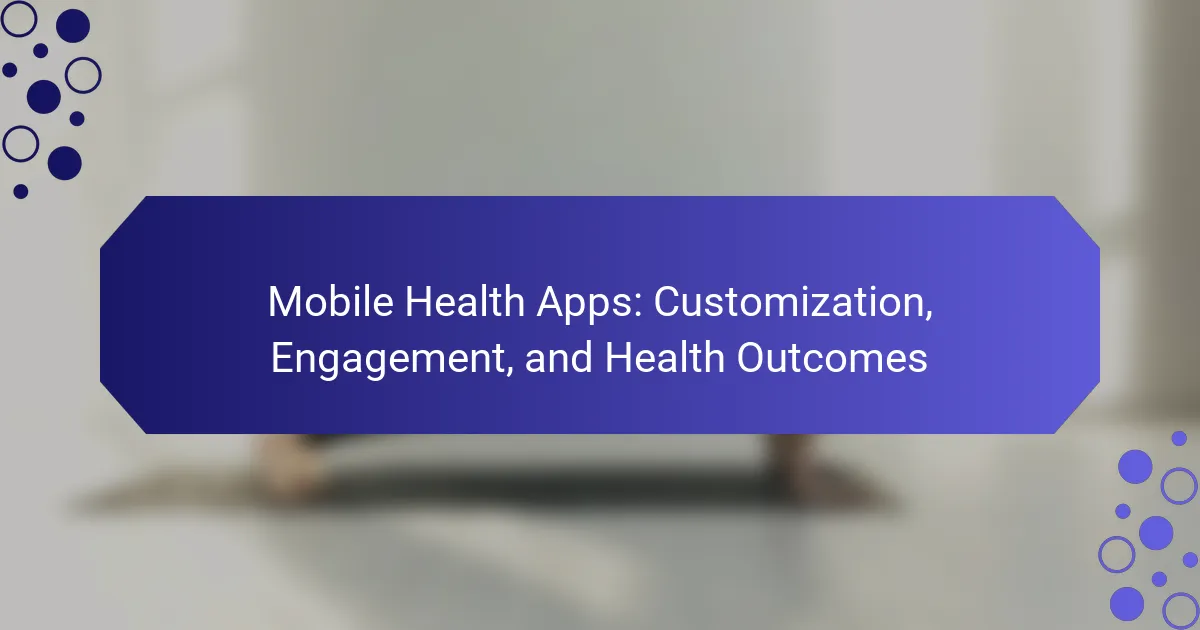Mobile health apps significantly enhance user engagement and improve health outcomes through customization, real-time feedback, and community support. They offer tailored health goals, reminders, and interfaces, catering to individual preferences. The effectiveness of these apps varies regionally, influenced by cultural and economic factors. Emerging technologies like AI and telemedicine are also shaping the future of mobile health applications.
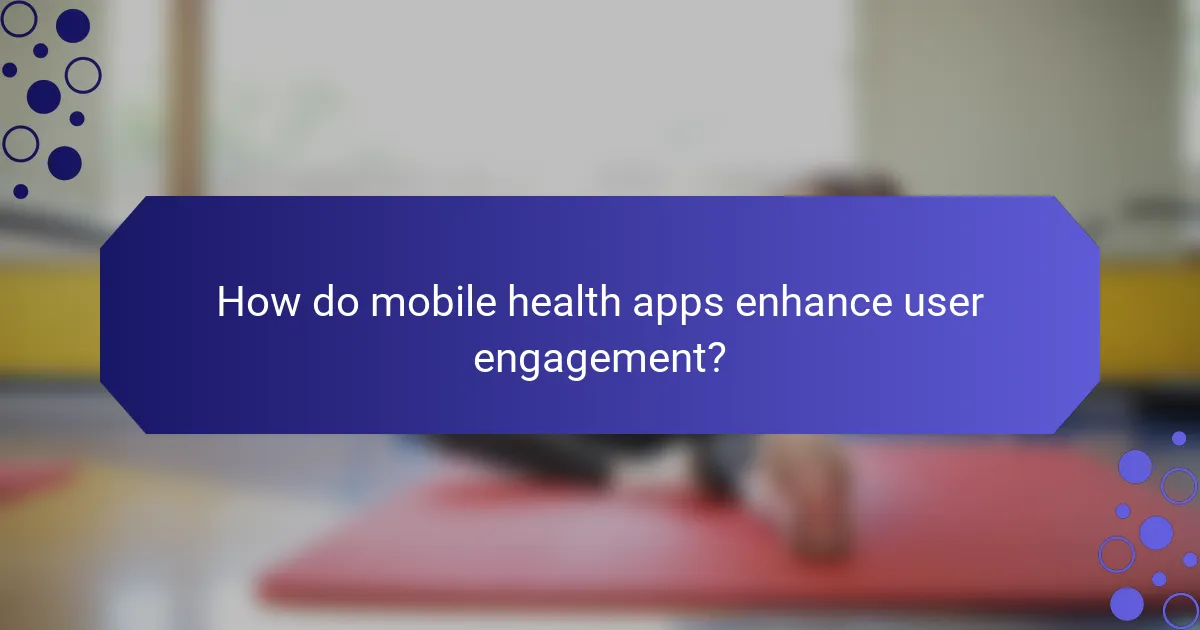
How do mobile health apps enhance user engagement?
Mobile health apps enhance user engagement through personalized features, real-time feedback, and community support. Customization allows users to tailor their experiences, improving adherence to health goals. Real-time feedback motivates users by tracking progress and celebrating milestones. Community support fosters connections among users, enhancing motivation and accountability. Together, these elements contribute to better health outcomes and sustained engagement with the app.
What features contribute to higher user retention rates?
Customization, user engagement, and personalized health outcomes significantly contribute to higher user retention rates in mobile health apps. Customization allows users to tailor their experience, enhancing satisfaction. Engaging features, such as reminders and gamification, motivate consistent use. Personalized health outcomes, driven by data tracking and feedback, foster a sense of achievement and commitment.
Why is personalization important in mobile health apps?
Personalization in mobile health apps is crucial because it enhances user engagement and improves health outcomes. Tailored experiences meet individual needs, fostering adherence to health plans. Customization can lead to increased motivation, as users feel more connected to their health journeys. Additionally, personalized feedback and recommendations can address unique health goals, resulting in better management of conditions and overall well-being.
Which gamification strategies improve user interaction?
Gamification strategies that improve user interaction in mobile health apps include personalized challenges, rewards systems, and social sharing features. These strategies enhance user engagement and motivation, leading to better health outcomes. For example, personalized challenges adapt to user preferences, while rewards systems provide tangible incentives for achieving health goals. Social sharing features foster community support, increasing accountability and interaction among users.
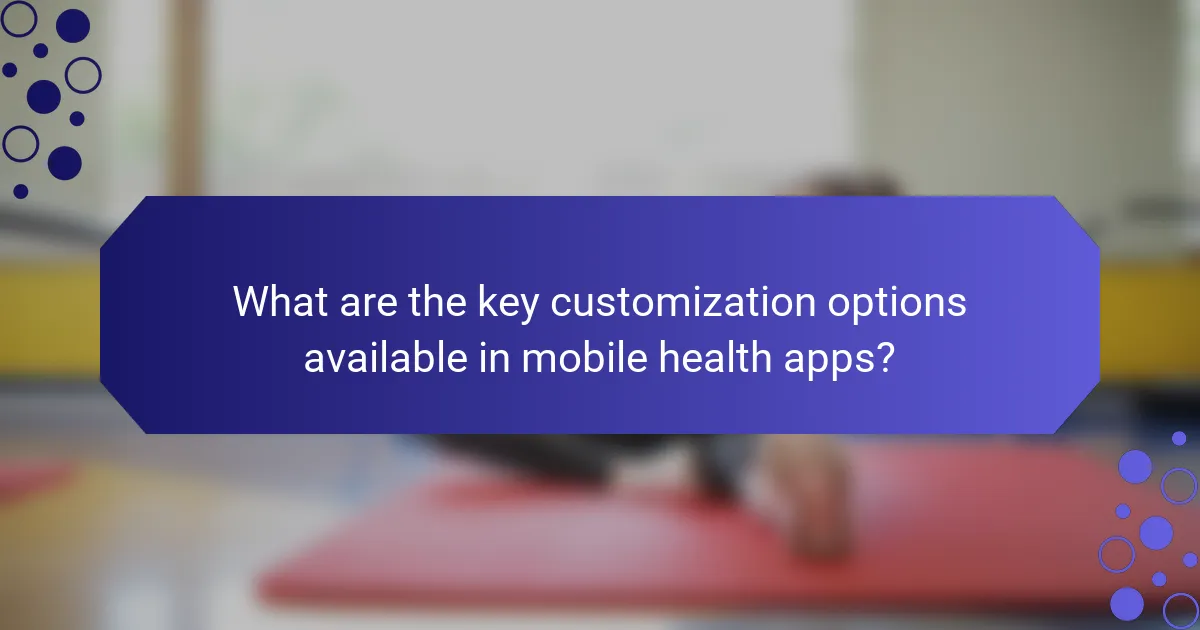
What are the key customization options available in mobile health apps?
Mobile health apps offer various customization options to enhance user engagement and health outcomes. Key options include personalized health goals, customizable reminders, user interface themes, and tailored content based on user preferences. These features cater to individual health needs and preferences, improving adherence and satisfaction.
How do users benefit from tailored health plans?
Users benefit from tailored health plans by receiving personalized recommendations that enhance engagement and improve health outcomes. Customization allows for the integration of individual health data, preferences, and goals, leading to more effective interventions. For example, users with specific conditions can access targeted resources, increasing adherence to treatment protocols. Additionally, tailored plans can adapt over time, reflecting changes in health status or lifestyle, which fosters ongoing motivation and accountability. This dynamic approach results in better health management and overall satisfaction with mobile health apps.
What role does user feedback play in app customization?
User feedback is crucial for app customization, enhancing user experience and engagement. It allows developers to tailor features according to individual preferences and needs. This personalized approach can lead to improved health outcomes as users are more likely to engage with apps that reflect their specific goals and habits. Regular feedback mechanisms, such as surveys and usage analytics, provide insights that inform updates and feature enhancements. By prioritizing user input, mobile health apps can adapt effectively, fostering a more supportive environment for health management.
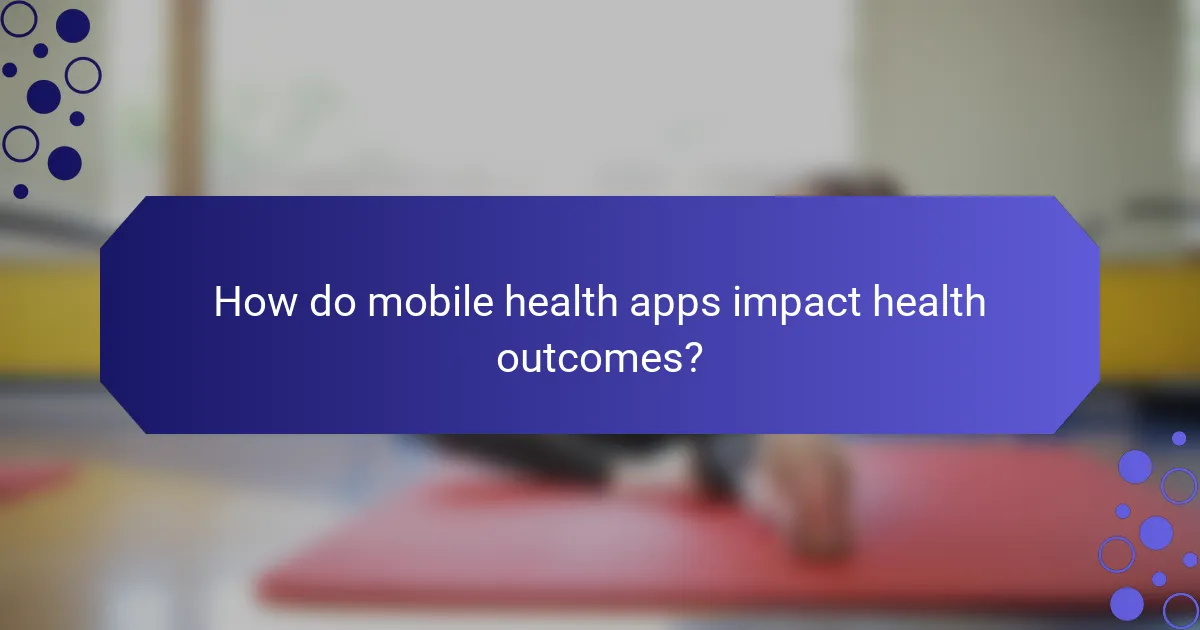
How do mobile health apps impact health outcomes?
Mobile health apps significantly improve health outcomes by enhancing user engagement and offering personalized experiences. These applications provide tailored health information, track progress, and facilitate communication with healthcare providers. As a result, users are more likely to adhere to treatment plans and make healthier lifestyle choices. Research indicates that patients using mobile health apps show improved management of chronic conditions, leading to better overall health. Customization features, such as personalized reminders and goal setting, further boost user motivation and satisfaction with their health journey.
What metrics are used to measure health improvements?
Mobile health apps measure health improvements using various metrics. Key metrics include user engagement rates, health outcomes, and user satisfaction scores.
| Metric | Description |
|—————————-|——————————————————-|
| Engagement Rate | Frequency of app usage and interaction |
| Health Outcomes | Changes in health indicators (e.g., weight, blood pressure) |
| User Satisfaction Score | Feedback on app usability and overall experience |
| Retention Rate | Percentage of users continuing to use the app over time |
| Goal Achievement Rate | Percentage of users meeting their health goals |
| Behavioral Changes | Modifications in lifestyle habits tracked by the app |
Which health conditions are most effectively managed through mobile apps?
Mobile health apps effectively manage conditions such as diabetes, hypertension, mental health disorders, asthma, and obesity. These apps enhance patient engagement and provide tailored health insights. For instance, diabetes management apps track blood sugar levels and offer dietary recommendations. Mental health apps provide therapeutic exercises and mood tracking features. Asthma apps monitor symptoms and medication adherence. Overall, mobile health apps improve health outcomes through personalized support and real-time data.
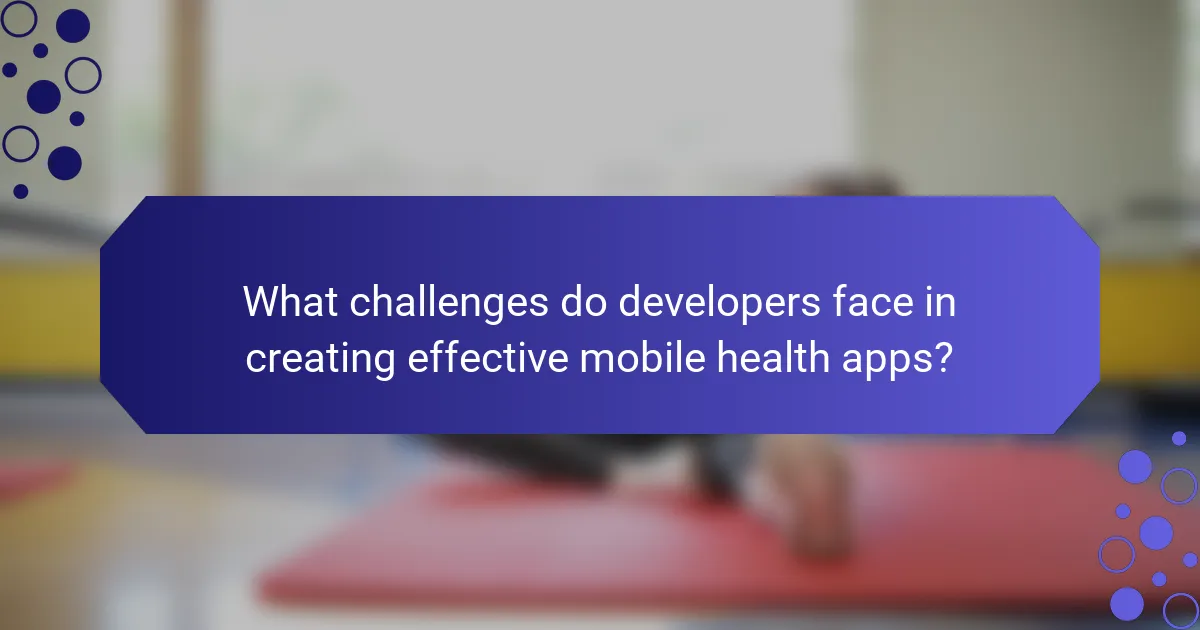
What challenges do developers face in creating effective mobile health apps?
Developers face several challenges in creating effective mobile health apps, including data privacy, user engagement, and integration with healthcare systems. Ensuring compliance with regulations like HIPAA complicates data handling. User retention is difficult due to the abundance of available apps. Integration with existing healthcare systems can be technically challenging, impacting functionality and user experience. Additionally, addressing diverse user needs requires significant customization efforts.
How does data privacy affect user trust and app usage?
Data privacy significantly influences user trust and app usage in mobile health applications. When users feel their personal information is secure, they are more likely to engage with the app and utilize its features. Studies show that 70% of users prioritize data privacy when choosing health apps. A lack of transparency regarding data handling can lead to distrust, resulting in decreased usage and high uninstall rates. Ensuring robust privacy measures can enhance user satisfaction and improve health outcomes.
What are common usability issues in mobile health applications?
Common usability issues in mobile health applications include poor navigation, unclear interfaces, and insufficient customization options. These factors can hinder user engagement and negatively impact health outcomes.
Users often struggle with complex layouts that make finding features difficult. Additionally, inconsistent design elements can confuse users, leading to frustration. Lack of personalization may result in users feeling disconnected from the app, reducing their likelihood of continued use.
Research indicates that apps with intuitive designs and tailored experiences improve user satisfaction and adherence to health goals. Addressing these usability issues is crucial for enhancing the effectiveness of mobile health applications.
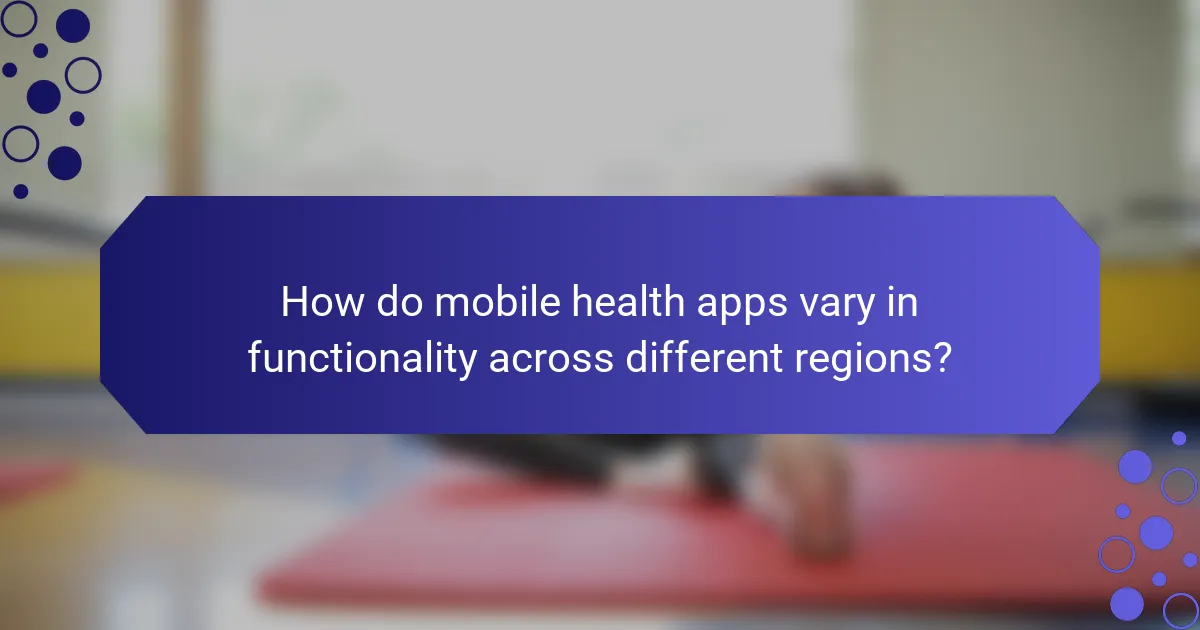
How do mobile health apps vary in functionality across different regions?
Mobile health apps vary significantly in functionality across different regions due to cultural, economic, and healthcare system differences. For instance, in developed regions, apps often focus on chronic disease management and integration with healthcare providers. In contrast, developing regions may prioritize basic health education and access to medical information.
Moreover, user engagement strategies differ; apps in regions with high smartphone penetration may incorporate gamification features, while those in areas with limited access focus on simplicity and offline availability. Local regulations also shape functionality, influencing data privacy and security measures.
As a result, the effectiveness of mobile health apps in improving health outcomes is closely tied to these regional variations, highlighting the need for tailored solutions.
What features are prioritized in North American mobile health apps?
North American mobile health apps prioritize user engagement, customization, data security, and integration with wearable devices. These features enhance user experience and improve health outcomes. User engagement is critical, with apps focusing on gamification and social sharing to motivate users. Customization allows users to tailor their experience, addressing unique health needs. Data security ensures user privacy, which is essential for trust. Integration with wearable devices provides real-time health monitoring, enhancing the app’s functionality.
How do cultural attitudes influence app design in different markets?
Cultural attitudes significantly shape mobile health app design across different markets. Designers must consider local values, beliefs, and user expectations to enhance engagement and health outcomes.
For instance, in collectivist cultures, apps emphasizing community support may perform better. In contrast, individualistic societies may prefer features that promote personal health management. Understanding these cultural nuances can lead to greater user satisfaction and improved health metrics.
Moreover, language preferences and cultural symbols influence user interface design. Localized content and culturally relevant imagery foster a sense of familiarity, enhancing user engagement.
In summary, cultural attitudes are crucial in tailoring mobile health apps to meet diverse market needs, ultimately impacting their success and effectiveness.
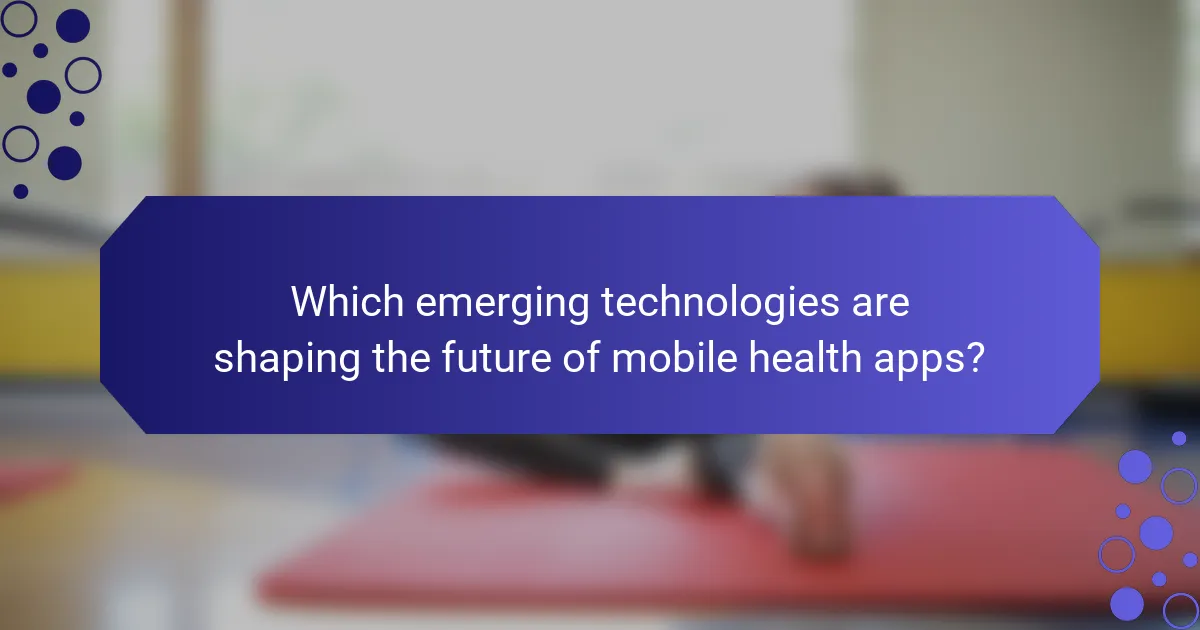
Which emerging technologies are shaping the future of mobile health apps?
Emerging technologies significantly shape mobile health apps by enhancing personalization, engagement, and health outcomes. Key technologies include artificial intelligence, which enables tailored health recommendations, and wearable devices that provide real-time health data. Additionally, telemedicine integration facilitates remote consultations, improving access to care. Blockchain technology enhances data security, fostering user trust. As these technologies evolve, they create a more responsive and effective mobile health ecosystem.
How does artificial intelligence enhance user experience?
Artificial intelligence enhances user experience in mobile health apps by providing personalized features and improving engagement. AI algorithms analyze user data to tailor recommendations, track progress, and adapt to individual health needs. This customization leads to better health outcomes, as users receive relevant information and support. Additionally, AI-driven chatbots offer real-time assistance, making it easier for users to navigate their health journeys. By leveraging machine learning, these apps can continuously improve their services based on user interactions, fostering a more interactive and effective health management experience.
What potential do wearable devices have in conjunction with mobile health apps?
Wearable devices enhance mobile health apps by providing real-time data, improving user engagement, and personalizing health outcomes. These devices track metrics like heart rate and activity levels, enabling users to monitor their health more effectively. Integration with mobile health apps allows for tailored feedback and actionable insights. For example, a fitness tracker can sync with an app to suggest personalized workout plans based on user activity. This synergy fosters a proactive approach to health management, encouraging sustained user engagement and better health outcomes.
What are the implications of telehealth integration in mobile health apps?
Telehealth integration in mobile health apps enhances accessibility, improves patient engagement, and supports better health outcomes. By offering remote consultations, patients can receive timely care without geographical limitations. This convenience can lead to increased adherence to treatment plans, as users engage more consistently with their healthcare providers. Additionally, telehealth features can facilitate real-time monitoring, allowing for personalized health interventions based on immediate data. As a result, this integration fosters a more proactive approach to health management, ultimately improving overall health metrics and patient satisfaction.
What best practices should developers follow to optimize mobile health apps?
Developers should prioritize user-centric design, data security, and personalization to optimize mobile health apps. Engaging users requires intuitive interfaces and regular feedback mechanisms. Incorporating gamification can enhance user motivation. Additionally, ensuring compliance with health regulations is crucial for maintaining trust and credibility.
